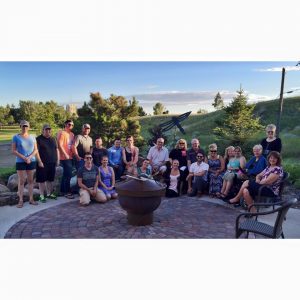Last month, I traveled from Seattle to Montana for Pride Foundation’s #PrideImpactMT Tour, stopping in Missoula, Helena, Great Falls, and Havre.
On the last evening of the tour, I stood on our event host’s patio in front of 28 LGBTQ and allied supporters from rural Northern Montana, in the small hamlet of Havre. Out toward the orange-hued southern horizon at dusk, I could see the hospital where I was born a little more than thirty years ago, and I felt the need to share one of my favorite T.S. Elliot quotes:
“We shall not cease from exploration, and the end of all our exploring will be to arrive where we started and know the place for the first time.”
I shared this quote because as a queer, Native kid growing up in Montana, I was once fearful of what life might be like if I were to live authentically. But on this patio, looking out into the caring eyes of the incredible individuals who are working to advance equality throughout the state, I sensed I was experiencing my home state with new eyes.
I wasn’t afraid anymore.
At that moment, it became clear to me that LGBTQ Montanans—and even scared kids like I once was—have people in their corner.
Just 110 miles southwest of Havre is the new Great Falls LGBTQ Center. Launched in April 2015 with the help of a Pride Foundation grant, it is part of an emerging ecosystem of LGBTQ supports in Montana. The Center’s new board chair, Shirley Cayko, who identifies as a lesbian, Christian, social worker, told me the Center’s story and how their work is to affirm every LGBTQ youth, adult, senior, and family and let them know that they matter.
Shirley shared how more than 3,000 LGBTQ and allied people attended this year’s Great Falls Pride. I could see the joy dance across her warm, hazel eyes—because we can both feel Montana changing.
The work of the Great Falls LGBTQ Center, and the other inspiring individuals and organizations across Montana, is changing the spirit of equality in the state. From supporting rural LGBTQ students through scholarships to investing in organizations working in health, youth homelessness, and racial justice, I am witness to the inspiring ways that we at Pride Foundation and our community of supporters in Montana are partnering together to make the entire state safer and more welcoming for our community.
One stop during my tour, however, weaves my story with that of Pride Foundation more powerfully than anything has up to this moment.
Between Great Falls and Havre is a small town at the westernmost edge of the Rocky Boy Reservation—surrounded by wheat fields, the Bear Paw mountains, and a big blue sky—called Box Elder, Montana, home of the Chippewa Cree Tribe.
In Native tradition, a strong connection to our land is important—in addition to our language and storytelling, it is one of the few ways we are bonded to our Creator, our faith.
And so I set out, collecting fresh soil in a mason jar from the land my grandparents lived on, each handful of dirt reforming the bond between my place and me.
This moment—after the visits, the tours, and the new faces—was when I knew I had experienced a full revolution. In that beautiful pause between Act I and Act II, I’d made peace with the pain and challenge of being queer in rural Montana. I no longer feel the same fear, hurt, or uncertainty I once did about being authentic.
At Pride Foundation we often talk about the importance of relationships—relationships with people and with place. Understanding the deep connection we all feel to the communities we call home, this mason jar of soil from my reservation serves as a reminder that the strong connections to our land—our place—are important and that Montana is a place full of hope.
While we have a long way to go before LGBTQ people are fully valued and affirmed throughout Montana, the work has already begun, and it is so bright to these eyes—seeing Montana for the first time, again.
Zachary Pullin is Pride Foundation’s Director of Communications & Education. Email Zachary.
